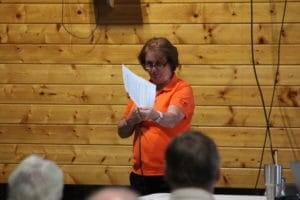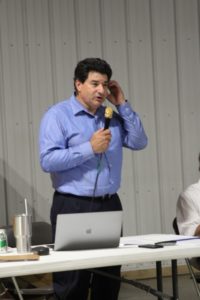by Dave DeMars
A crowd of about 200 St. Joseph Township residents gathered in the AMI Auction Facility on July 17 for a public hearing on what was going to become of the township and how it might change and affect them. After a long, raucous meeting, the St. Joseph Township Board voted 3-0 to accept the resolution for designation of an area for immediate annexation pursuant to Minnesota Statutes 414.0325.
Township Chair Mark Thompson called the meeting to order before handing it off to the township attorney Michael Couri. Couri set about the process of explaining the issues and laying out the options.
The city of St. Joseph had voted on July 16 to annex portions of the township, Couri said, and had been meeting with members of the township board to try and hammer out some compromise agreement to defuse some of the anger township residents had expressed in earlier meetings. A July deadline was jointly agreed to by the city and township negotiators.
Couri explained the annexation disagreement stems from the city taking the position they had a contractual right to annex portions of the township under the Orderly Annexation Agreement of 2010. The township maintained a different position. Hence, the dispute, and the meetings since January to the present to find a compromise position.
Couri pointed out on a map that the city is not looking to annex all of the township, only certain portions of it. Couri told the crowd if the annexation issue is not settled, it would end in litigation, and townships throughout the state have not fared well when facing the administrative law judge.
“Basically, it’s winner take all,” Couri said. “And even if we win in court, the city can annex the township in other ways.”
What the township board presented to the residents was a compromise that secured some concessions for residents.
“It’s what each side thinks they can live with,” Couri said.
Of key concern to residents was the issue of tax rates. The township tax rate is 21.92 per thousand dollars of valuation while the city is 61.46 per thousand dollars valuation. To reduce the impact the agreement established a rural taxing district that would tax at the 2018 rate of township taxes. Increases in tax rates would be proportional to the city’s overall 2018 tax rate.
To lessen tax consequences on township residents not annexed, the city would reimburse the township for tax revenue lost as a result of the annexation of property from the township. The reimbursement would be a percentage of tax collected starting with 100 percent in 2019, 90 percent in 2020, and reducing to 20 percent by 2024.
Many residents saw the annexation as a ploy to grab tax dollars from the township. Couri explained the compromise agreement was better than the 2010 agreement in its treatment of taxes and in other areas. Without the compromise agreement, the city could file for annexation, probably win, and then levy taxes at the city rate immediately rather than the gradual increases proposed.
Couri explained further that much of what was set up in the compromise was circumscribed by state statute.
“I wish we could do more,” Couri said. “We can’t.”
Resident Colleen Donovan wanted to know what state statute allowed the city to tax her for services she didn’t want. She went on to chide Couri for giving incomplete information, referring to a map he was using. You’re not giving me all the information, she said, and urged the board not to accept the compromise proposal.
“United we stand, divided we fall,” said Donovan, who received a rousing round of applause.
Carmie Mick supported Donovan saying she went through annexation before in Waite Park. She expressed concern about the way in which special assessments for water and sewer would be parceled out. She feared it would be a financial burden and would get levied all at once.
Searching for an escape mechanism, Burt Walz suggested perhaps the township could incorporate and become its own city. Couri admitted it had been done, but that it was very expensive and also involved a good deal of risk in that the city might withdraw from the compromise and file to annex and be able to levy taxes at the city rate.
“Either the city takes action unilaterally, or we negotiate,” Couri said. “That is what we are discussing.”
The crowd grew restless and there were shouts about the board not representing the best interests of the people, how information presented was incomplete and how the move by the city was simply designed as a money grab.
“Just vote no. There is no more conversation needed on this,” shouted one audience member.
Floyd Ostendorf analyzed the situation and questioned why, if the city of St. Joseph was not in need of the money, they were pursuing annexation now? He suggested the city let the process of annexation evolve naturally rather than pushing it on people who do not want to be annexed.
“Even though you have a legal right to do this, it is not what people do,” Ostendorf said.
Others seized on the idea of delaying the process and asking for more time to study the issue. What would it hurt? Why the rush was the question? One audience member asked what would be the result if the board simply tabled the measure or voted to study it further. Another resident asked what City Administrator Judy Weyrens would recommend to the council if the matter were tabled. City Attorney Sue Kadlec answered and she said she was not willing to answer as that is a discussion with the city.
She replied she did not want to share that information with the audience.
Couri explained the city had set July as the time by which they would have the issue decided. The Council had already voted to annex. If the board voted to table or delay, Couri said he felt the city would simply scrap the negotiated compromise and file for annexation under the 2010 agreement. That would mean the city could proceed to levy higher taxes than that negotiated in the compromise, and they could enforce all the city statues since there would be no compromise agreement to dictate otherwise.
The township could challenge the annexation petition in court, but that would involve a lengthy and costly legal battle and, given past precedent, would likely end with the city’s position being affirmed.
“Even if we win, we’re going to lose,” one resident grumbled.
By 10 p.m. the crowd had begun to dwindle. There were still questions and some sporadic flashes of anger, but the crowd seemed to have accepted as inevitable the fact that the negotiated compromise would be the best deal they could get in the annexation debate.
By the time the township board voted on the measure, the anger and frustration had become more exhaustion and resignation. The annexation had been talked about and examined from all sides. There was nothing more to be done. In the end, the township board voted 3-0 to accept the resolution for designation of an area for immediate annexation pursuant to Minnesota Statutes 414.0325.

A crowd of about 150 St. Joseph Township residents gathered to learn about the annexation of parts of the township to the city of St. Joseph and how that would affect their lifestyle and finances.

Colleen Donovan shakes a copy of the resolution as she asks what statute gives the city of St. Joseph the right to tax her for services she does not want or need. We should oppose the proposal. “United we stand, divided we fall,” she said.

St. Joseph Township Board members, (left to right) Mark Thompson, Steve Gohman and Ralph Eiynck cast their votes to accept the joint resolution to allow for annexation of a portion of St. Joseph Township.

Township attorney Michael Couri explains the benefits of the negotiated compromise as opposed to the 2010 Orderly Annexation Agreement. “I wish we could do more, but we can’t,” he said.

Floyd Ostendorf suggests that if the city doesn’t need the money, then perhaps they should stop the annexation process. “Let annexation come as a natural process,” he said.

Bob Anderson addresses the township board with several questions related to how taxation will work after the annexation.



